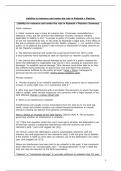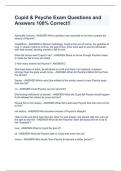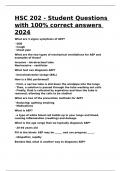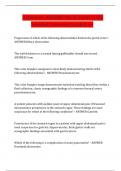Topic 6 - Organic Chemistry 1
The Basics
What is a homologous series?
A homologous series is a bunch of organic compounds that have the same
functional group and general formula
Consecutive members of a homologous series differ by -CH2
Name all the homologous series with their prefix/suffix and an example
Alkanes -ane e.g. propane CH3CH2CH3
Branches alkanes -alkyl (-yl) e.g. methylpropane
CH3CH(CH3)CH3
Alkenes -ene e.g. propene CH3CH=CH2
Halogenoalkanes chloro-/bromo-/iodo- e.g. chloroethane CH3CH2Cl
Alcohols -ol e.g. ethanol CH3CHO
Aldehydes -al e.g. ethanal CH3CHO
Ketones -one e.g. propanone CH3COCH3
Cycloalkanes cyclo-....-ane e.g. cyclohexane C6H12
Carboxylic Acids -oic acid e.g. ethanioc acid CH3COOH
Organic Reactions
Name the 7 main reactions types and describe them
Addition
joining two or more molecules to form a larger molecule
Topic 6 - Organic Chemistry 1 1
, Polymerisation
joining together lots of simple molecules to form a giant molecule
Elimination
when a small group of atoms break away from a larger molecule
Subsitution
when one species is replaced by another
Hydrolysis
splitting a molecule into 2 new molecules by addin H+ and OH- drived from
water
Oxidation
any reaction in which a species loses electrons
Reduction
any reaction in which a species gains electrons
What is a mechanism?
A mechanism breaks down a reaction into indivisual stages
Draw a reaction and mechanism to show how chloromethane reacts with
aqueous potassium hydroxide to form methanol and potassium chloride
Topic 6 - Organic Chemistry 1 2
, Isomerism
What is meant by an Isomer?
Two molecules are isomers of each other if they have the same molecular
formula but the atoms are arranged differently
Describe chain isomers
The carbon skeleton can be arranged in different ways, branched or straight
These isomers have similar chemical properties BUT physical properties such
as BP will be different due to the change in shape
Describe positional isomers
here the skeleton and functional group can be the same, only with the
functional group attached to a different carbon
these have different physical properties and chemical properties might be
different too
Describe functional group isomers
the same atoms can be arranged into different functional groups
These have very different physical and chemical properties
Alkanes
What is an alkane? General formula?
Alkanes are saturated hydrocarbons because all the carbon carbon bonds are
single and they've got carbon and hydrogen atoms only
C n H 2n+2
Why are alkanes unreactive?
alkanes are uncreative because they are non polar with low electron density
between the carbon atoms
Describe hetrolytic fission
Topic 6 - Organic Chemistry 1 3
, In hetrolytic fission the bond breaks unevely with one of the bonded atoms
recieving both electrons from the bonded pair. Two different substances can be
formed - e.g. a positively charged cation and a negatively charged anion.
Describe homolytic fission
In homolytic fission the bond breaks evenly and each bonding atoms
receives one electron from the bonding pair. Two electrically unchagred
radicals are formed. Radicals are particels that have an unpaired electron.
Radicals are very reactive because of this.
How does an Alkane react with a Halogen?
presence of UV light
Radical subsitution reaction
forming halogenoalkanes
Describe the initiation stage
during initiation radicals are produced
Topic 6 - Organic Chemistry 1 4










